People today that suffer from allergies and breathing problems already know that decreasing air quality is only making them sicker. On the other side of the equation, actually improving air quality in the home may seem like a hopeless task because it impossible to get rid of all the air leaks and drafts.
In most cases, these drafts aren’t the actual problem. Rather, it is the lack of good air flow throughout the building that allows dust, toxic gasses, and other pollutants to build up. This is just one of many reasons why you may benefit from building a DIY air purifier based on a box fan.
Why You Need to Purify the Air in Your Home
Even if you aren’t suffering any effects from air pollution, it is still important to make sure that you can remove any number of toxins in the air during a major crisis. For example, a major wild fire outbreak, gas attack, nuclear attack, and other problems will either force you to wear a gas mask all the time, or be able to control the air quality enough so that you do not need to wear a mask.
While the basic DIY air purifier described in this article will not filter out 100% of toxins all the time (this version filters out about 50 – 70% depending on the pollutant and the filter lifespan position), it will give you enough difference in air quality to manage a number of situations.
In addition, with a a few changes in the filter media and changes to the air flow in your home, it forms a vital basis for any air purification system that will have close to a 100% efficiency level.
DIY Box Fan Air Purifiers vs. Pre-Built
As a means of summary, DIY box fan air purifiers are more efficient and have greater potential for expansion across every comparable measure when compared to pre-built air purifiers that you commonly see in department stores. Have a look at how a 20 x 20 box fan can easily beat just about every model on the market for a fraction of the cost:
CFM (cubic feet per minute) – this is the amount of air that the unit is capable of circulating through the filter apparatus. The higher the CFM, the better. Most small air purifiers only produce about 100 CFM, while larger units designed for medium sized rooms will produce about 400 CFM.
By contrast, a 20 x 20 box fan on its highest setting will produce about 2500 CFM. You may lose around 400 – 500 CFM when using higher capacity filters, however even at that reduction, the CFM is easily 3 – 4 times more than the maximum output of more expensive options.
Filter surface area – in general the greater the surface area, the better the filter will be at capturing particles without clogging up or impeding air flow. Most conventional air purifiers on the market have decidedly puny air filters that measure well under 10” x 10”.
In fact, most purifiers have filters that are around 6” x 8” or 9”. On the other hand, when you fit a filter for a box fan, the most active area will extend across the entire diameter of the blades. In most cases, this is about 15 – 16” across (including the subtraction for the fan motor vent area).
This Device Easily Turns Air Into Water!
Here, you have double the surface area with good air movement across the area. Depending on how you arrange your filter layers, it is also very easy to double or even triple this extended surface area and even recapture some of the lost CFM.
Easy to customize – no matter whether you need to get rid of gasses and fumes with activated carbon, get rid of bacteria, or manage mold, pollen and mildew, there is likely to be a filter or combination of filters that will meet your needs.
While pleated filters tend to allow a larger surface area, do not overlook padded versions that offer excellent air flow, and sometimes a lower cost. By contrast, when you buy a conventional air purifier, you must also purchase the pre-made filters. If the manufacturer does not offer a permanent filter, an activated carbon pre-filter, or decides to stop making replacement filters altogether, you will be stuck with a useless unit.
Box fans and filters are much cheaper and last longer. Conventional air filters will cost a minimum of $60.00 off the shelf for a relatively small unit. On the other hand, a brand new box fan costs about $20.00.
A good quality 3M Merv 12 filter with an electrostatic grid costs about 15.00, and an activated carbon pre-filter costs between $10.00 and $20.00 depending on the brand and design. If you decide that you want a HEPA grade (Merv 13 and above), the cost per filter ranges between 12.00 per filter and up, depending on where you buy them and the quantity.
Your total cost for a DIY box fan filter can be as low as $40 – 50.00 (including incidentals like duct tape), or higher depending on the filter options. Insofar as filter changing costs, you will find that it is still much cheaper to buy furnace filters and variants of them without sacrificing on quality or air cleaning capacity.
Speaking of filter ratings, most air purifier manufacturers only state that the filter is a HEPA filter. While you may assume this means the filter is at a hospital grade or above, they may be using a filter that is barely above the top level filter you would use for your heating system.
On the other hand, when you buy filters for your box fan, you will always know the exact efficiency rating. Depending on the manufacturer, you may also be able to see the test results for each filter.
Filter Options and What They Mean
Before you decide on a specific filter or combination of filters, it is very important to know how they are rated and what you can expect.
Efficiency Ratings – this refers to the particle size that can be removed by the filter. Typically, the higher the efficiency rating, the more particles the filter can remove without becoming clogged up. Higher efficiency ratings also give you some information about the size of the particles that can be captured.
Filters with a higher efficiency rating can capture a higher percentage of smaller size particles. For example, a MERV 10 filter may capture as much as 70% of pollen and mold spores, but only 20% of bacteria, while a MERV 12 will capture as much as 90% of pollen and mold, but as much as 40% bacteria.
Even though both filters will be rated for capturing these particles, the higher MERV rating still means a better rate of capture. Aside from MERV ratings, you may also see some other scales being used such as FPR and MPR. Most filters will come with a handy guide for showing what each filter will remove.
You should still compare the scales to gain some ideas about the percentage of particles removed.
Pleated Filters and Pleat Sizes – as you may be aware, folds can greatly extend surface area without taking up more space in terms of length and width. As with your brain and intestinal tract, pleated filters also have double or better surface area as filters without pleats.
That being said, there is a delicate balance between having so many pleats they interfere with each other and ones that don’t take advantage of the maximum surface area expansion. The depth of the pleats is also very important. Deeper pleats can translate to longer lasting filters without necessarily sacrificing efficiency.
You are best served, however, with starting off with conventional 1/2” pleats, and then move up from there if you feel it is needed.
Pad Filters – these filters do not have pleats, and are usually made from various fibers. They are not as efficient as pleated filters, and usually do not go above MERV 8 or 9. These filters are good for pre-filtering, however the best quality will still come from pleated variants.
Electrostatic Grids – dust and many other airborne particles carry a weak electrical charge. When air passes over the metal electrostatic grid, it also generates a very weak charge that attracts airborne particles. This can draw in more particles faster and increase the overall efficiency of the filtering system.
If you are going to build your own filters or trim down rolls of pleated material, it is worth your while to buy media that has the electrostatic grid included.
Activated Carbon – if you are concerned about poison gasses, volatile organic compounds, automobile exhaust, and other fumes, filter media impregnated with activated carbon will be absolutely essential. Since the MERV ratings for these filters doesn’t exceed an 8 or 9, you will have to use it as a pre-filter.
Fortunately, MERV ratings don’t have anything to do with the overall efficiency of the carbon layer. It will still remove the same amount of gasses and toxins regardless of the percentage and size of solid or liquid particles removed by the supporting media.
Reusable Filters – at this time, it is very hard to find a good quality, inexpensive reusable filter with a guaranteed MERV efficiency rating. If you are committed to using reusable filters, try to see if you can find a company to custom manufacture some on your behalf.
This is an expensive option, however if you can get the quality you need in a filter that will last a lifetime, it will save money and concerns over stockpiling filters in the long run. Just make sure that you have a reliable system onhand to test the quality of the filter once you receive it, and that the company has a good reputation and warranty system.
Items and Tools You Will Need
Once you purchase the fan and filters, it will take very little in the way of tools and time to assemble a Box Fan Air Purifier. In most cases, you can complete the initial installation in about half an hour. Later on, when you change the filters, allow for an additional 10 minutes or so to vacuum out the motor and remove dust from the fan blades.
- Duct tape
- cardboard (you can use the box the fan came in for this part)
- permanent marker
- drafting compass
- scissors
- padded work gloves
- fan (20 x 20 box fan, any model and manufacturer)
- filters (depends on your needs and research findings). This article is based on the 3M MERV-12, 20 x 20 pleated filter and the WEB Absorber Cut to Fit 20 x 25 filter.
Building the Box Fan Air Purifier
Start off by unpacking the fan and making sure that it works. Run the fan on high speed for at least 48 hours to make sure it does not have an strange odors or burning smells. If you detect anything bitter, foul, or “electrical”, return the fan immediately and exchange it for another one.
A fan with a smelly motor at the beginning will continue to smell. It’s just not worth the effort to put up with it.
Next,
At the back of the fan, carefully measure the diameter of the motor vents.
It is very important to keep these vents open because the motor will get quite hot from constant operation. Covering the vents will only shorten the life of the fan and provide little in the way of useful filtration.
Take a drafting compass and make a circle on the cardboard large enough to cover the motor vents. Next, cut the cardboard into the shape of a circle. You now have a template to use for cutting the holes in any filter you decide to attach to the fan.
Attach a small piece of duct tape (or clear tape) to the template so that some of the sticky side touches template, and more sticky surface is exposed to the air. Place the template over the fan motor holes.
Lay the innermost filter on top of the fan and template. Make sure that the air flow arrows on the filter match the direction the air will flow through the fan. Press down slightly on the center of the filter. At this point, the template should stick to the filter. Simply lift the filter up and you will know exactly where to cut the hole into the filter.
Use a permanent marker to trace a circle around the template. When drawing the circle on pleated media, you only need to mark the top of the pleat.
Put on padded work gloves for the next few steps. The electrostatic grid on the filters is very thin and can cut into your skin easily. While these aren’t necessarily big wounds, it is still best to avoid them.
Remove the template and proceed to cut out the circle area from the filter with the scissors. The easiest way with pleats is to snip the top as far down as you can reach with the scissor. Next, flip the filter over and match the scissor snips on what is now the top surface of the pleat. Do not cut the electrostatic grid during this process.
Carefully reach into the pleated area, and pull the cut circle area through the electrostatic grid. Work the paper back and forth until you get a feel for how to pull on the paper to bring it through the grid without breaking the metal. If the paper feels to thick or bunches off, cut some off and continue pulling through another hole. When you are done, the filter should look like this:
If you are using a prefilter, you will also have to cut a hole in that one. Keep the first filter in place and fit the template back over the hole. Make sure some sticky tape is exposed.
Place the prefilter on top of the template so that it fits correctly on the fan.
if the filter is too large in length or width, use the scissors to cut it down to size.
Press the second filter down in the center region to engage the tape. Lift the filter and flip it over so you can see where the template is stuck.
As long as the filter is not pleated, you can just use the scissors to cut around the template.
Make sure the inner filter is in proper position.
Place outer filter on top so that the holes line up with the holes in the fan motor.
Place the grille that comes with the Web Absorber Cut to Fit pads over the two filters.
Take some duct tape and slice the strip down the middle about 1 ½ inches.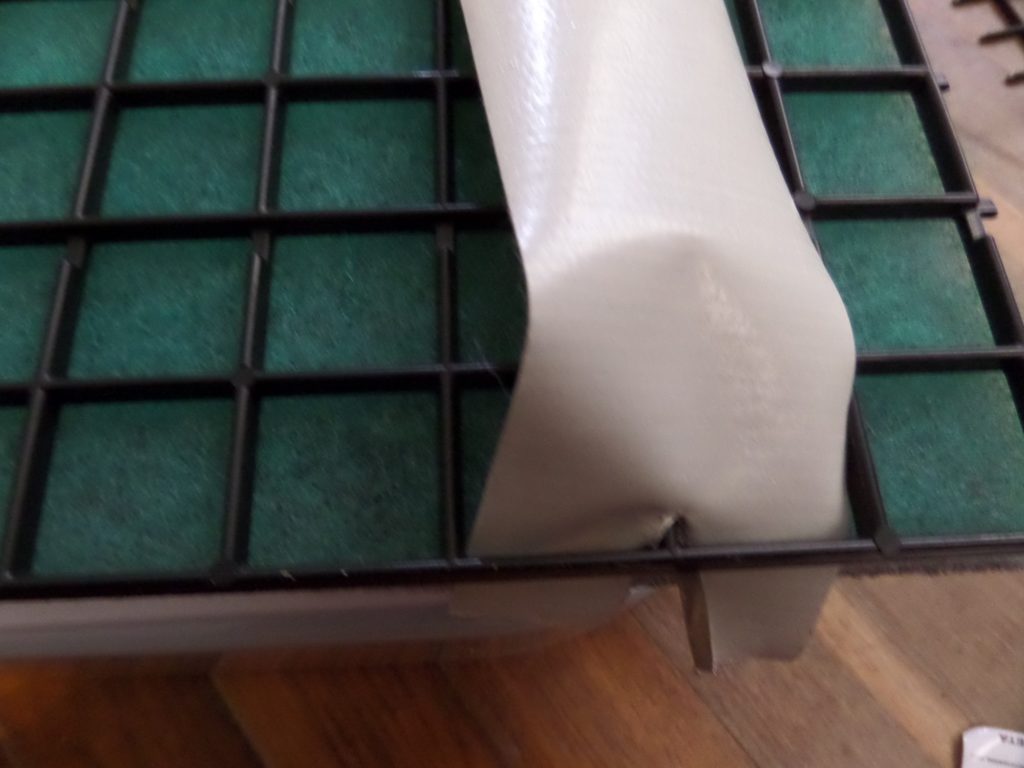
Fold the tape over the bars so that it sticks to itself, like this:
Finish off the taping by attaching it to the side of the fan. Use at least two pieces of tape for each side of the fan to ensure the filters stay in place.
Your DIY air purifier is now ready to use. Put it near heating vents, doorways, or other areas where dust and contaminated air are most likely to come in. Do not forget to change the filters at recommended intervals, or more often if they become soiled quickly.
During this process, always vacuum out the motor and fan blades so that dust does not build up. At the beginning, you may go through more filters simply because there may already be a sizeable build up of pollution that you are so used to you don’t notice it anymore.
Rest assured, however, as the air gets clearer and cleaner, you will definitely notice when the filters need changing!
Safety Precautions
As with any other electrical appliance, there is always the risk of overheating or a fire. You should never leave the fans unattended. If you must leave the house, even for a short time, close them down and unplug them.
Remember, even though you are allowing air flow for the motor, this is still not a listed “safe” application for a box fan. Never trust these devices to be unattended. As a final note of safety, use this design at your own risk. Results and outcomes may vary. Neither the author nor the publishers are responsible for any injuries or other damage that may result from using this design or recommendations.
When it comes to affordable and efficient air purification methods, I have found nothing that works as well as attaching regular heating system filters to the back of box fans. While there are some important precautions that must be observed, this system can work and produce clean air for years to come.
If you have experience already with this kind of system, or have tried other air purifiers, I would love to hear about your results and see if they match mine.
This article has been written by Carmela Tyrell for Survivopedia.


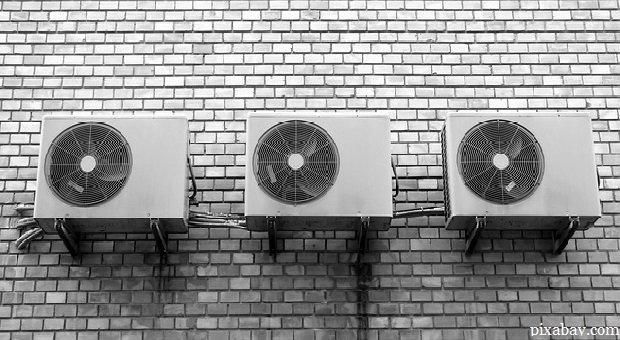
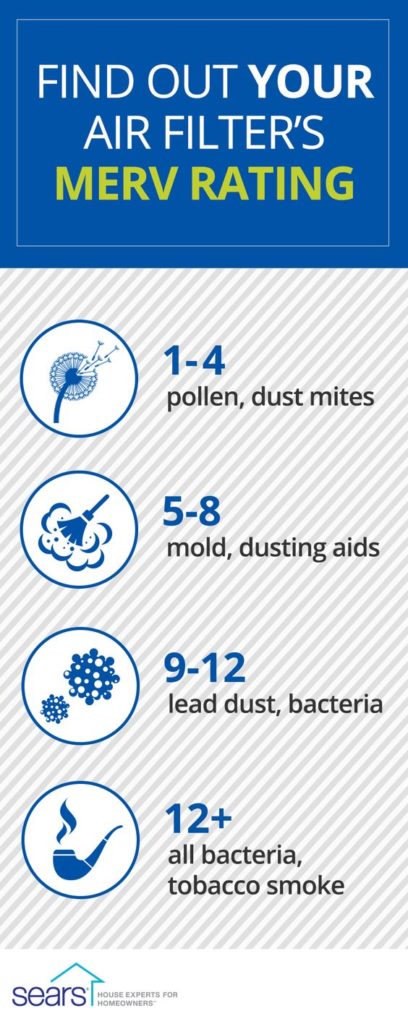
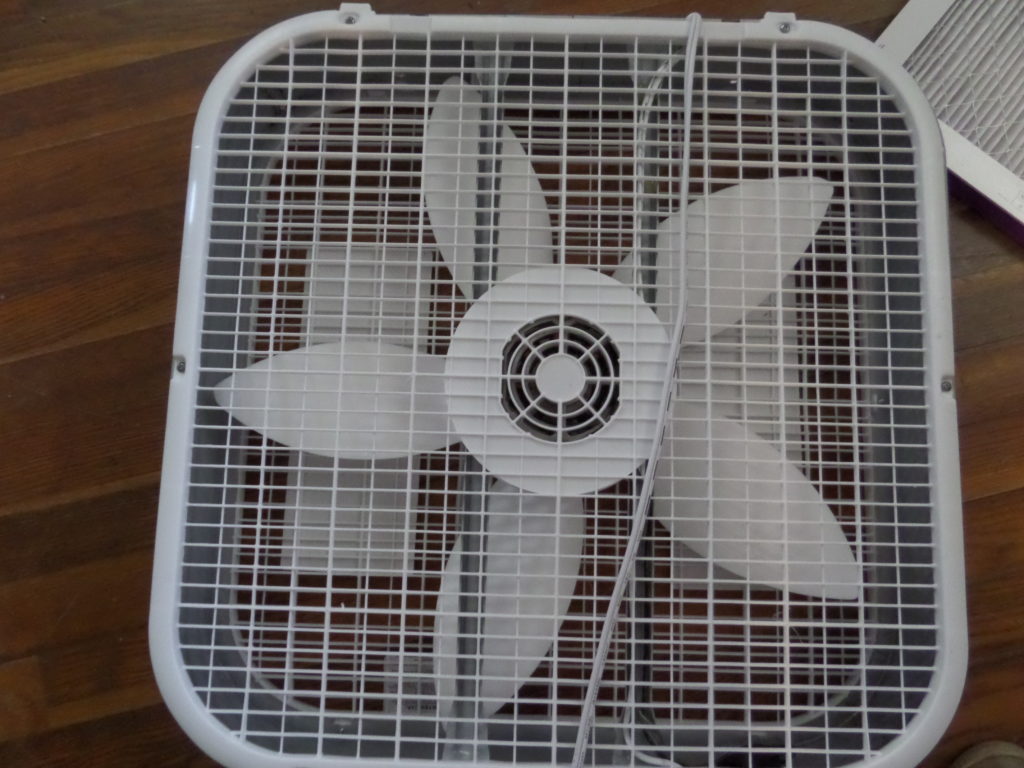
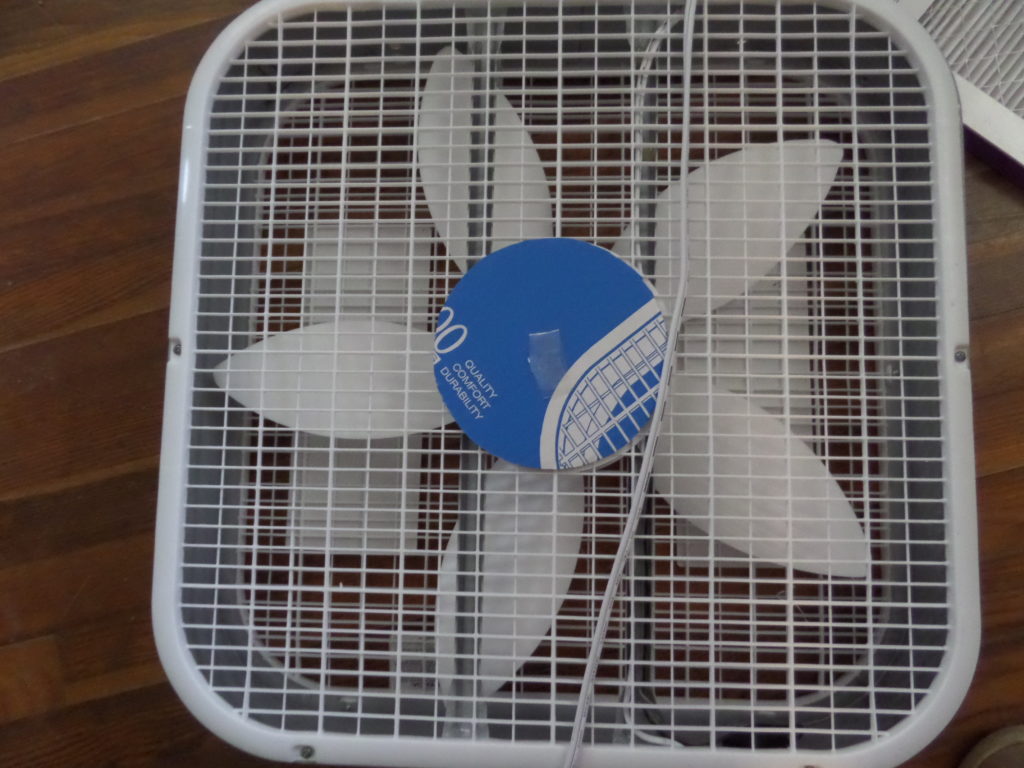
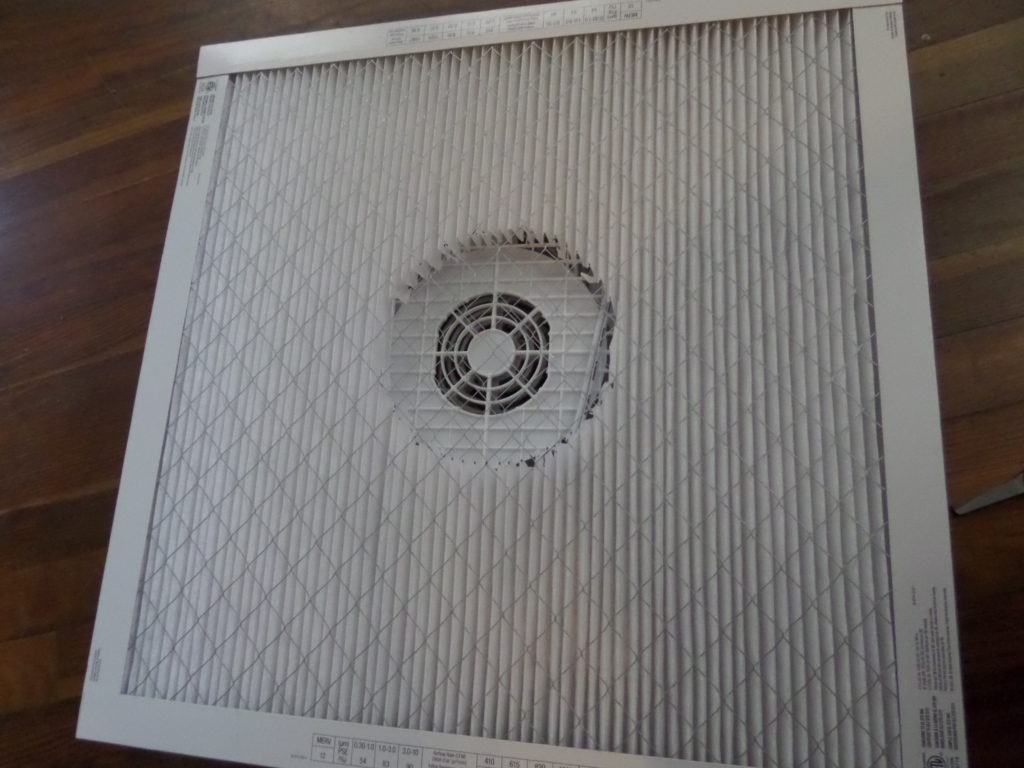
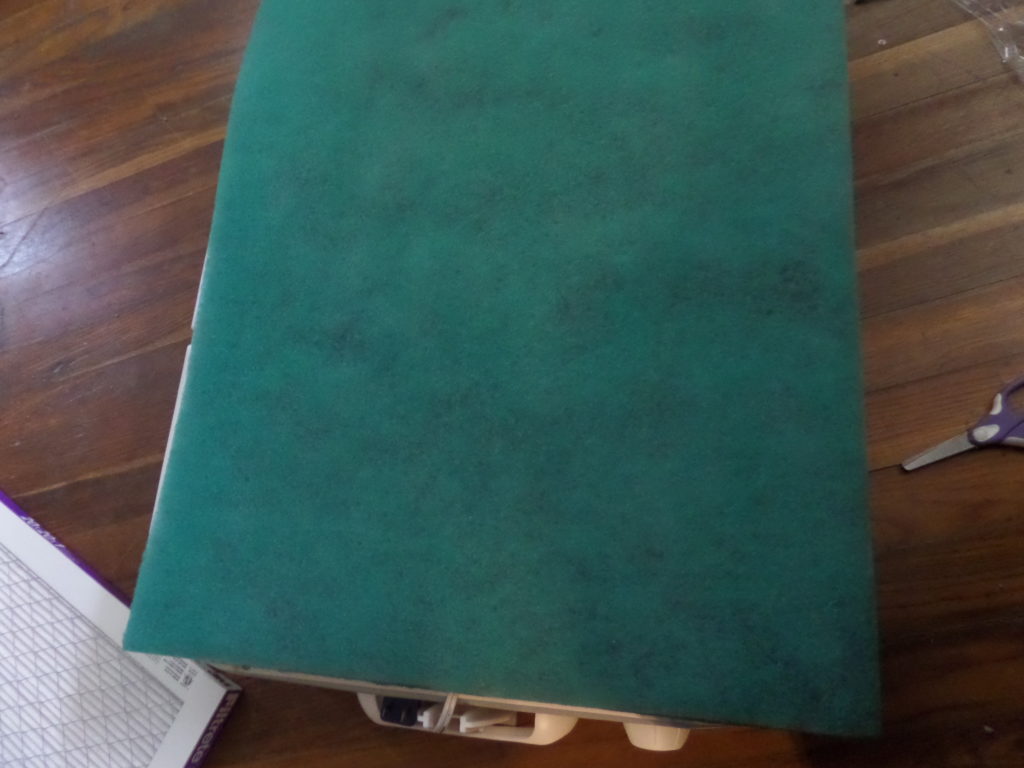
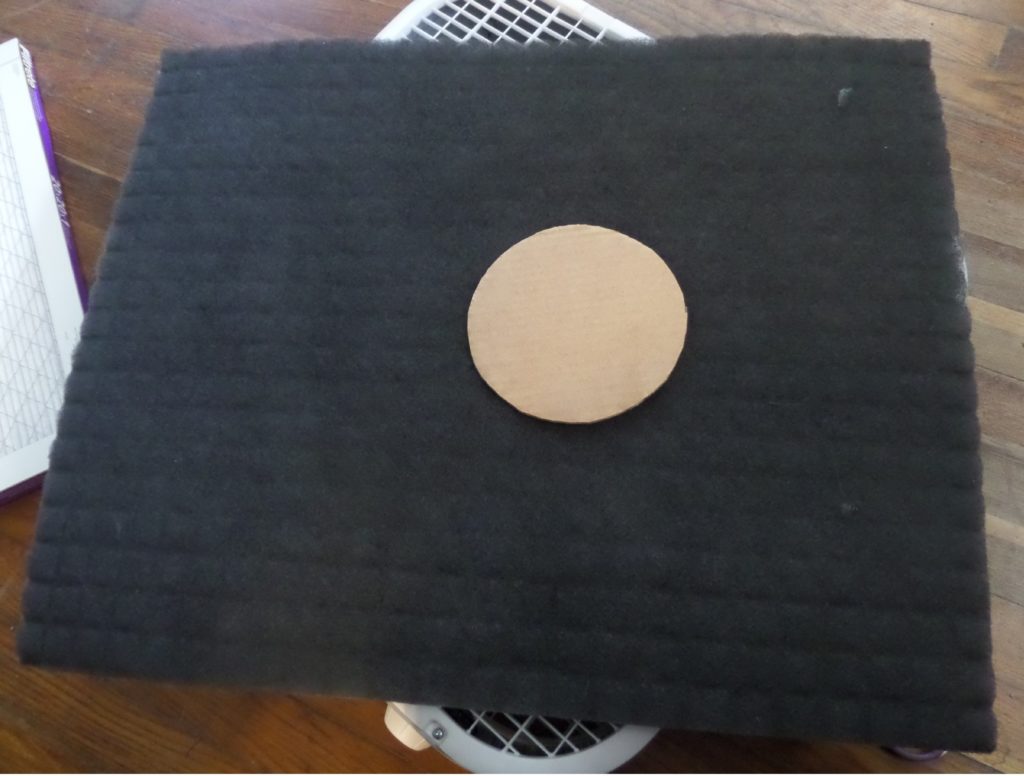
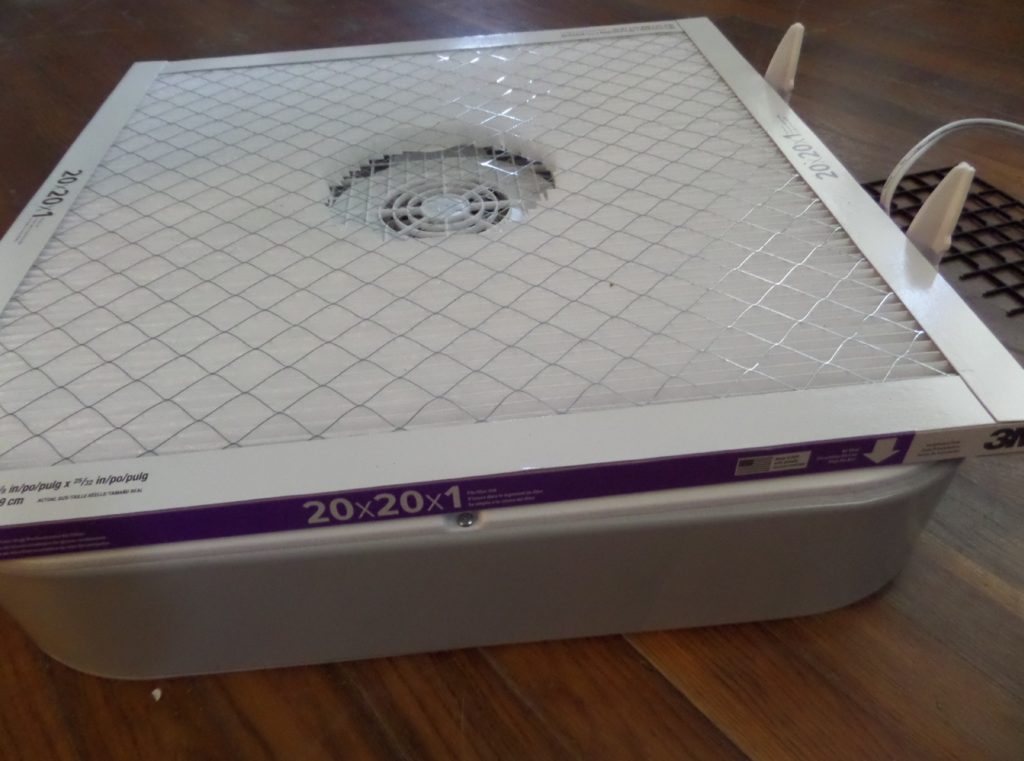
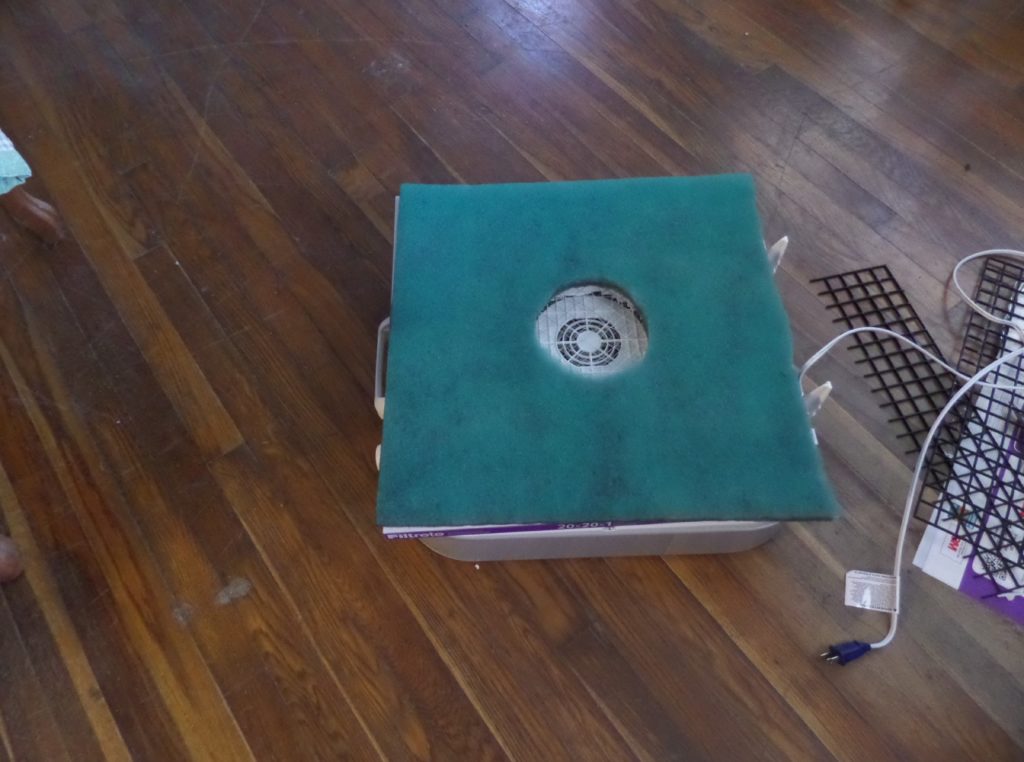
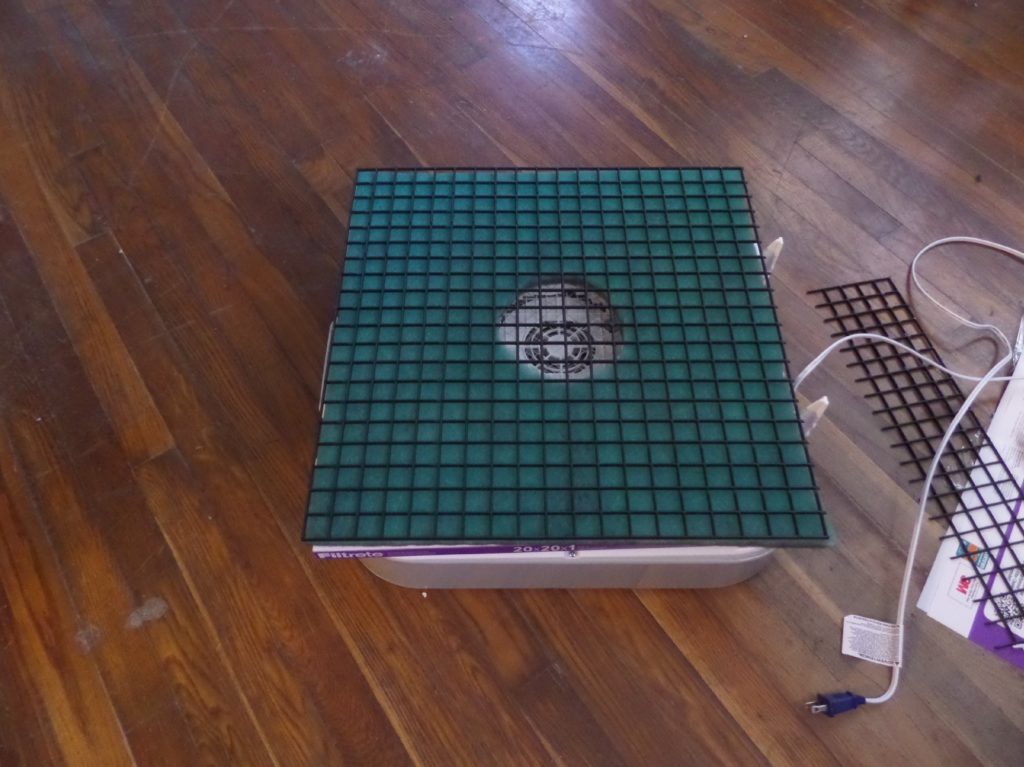
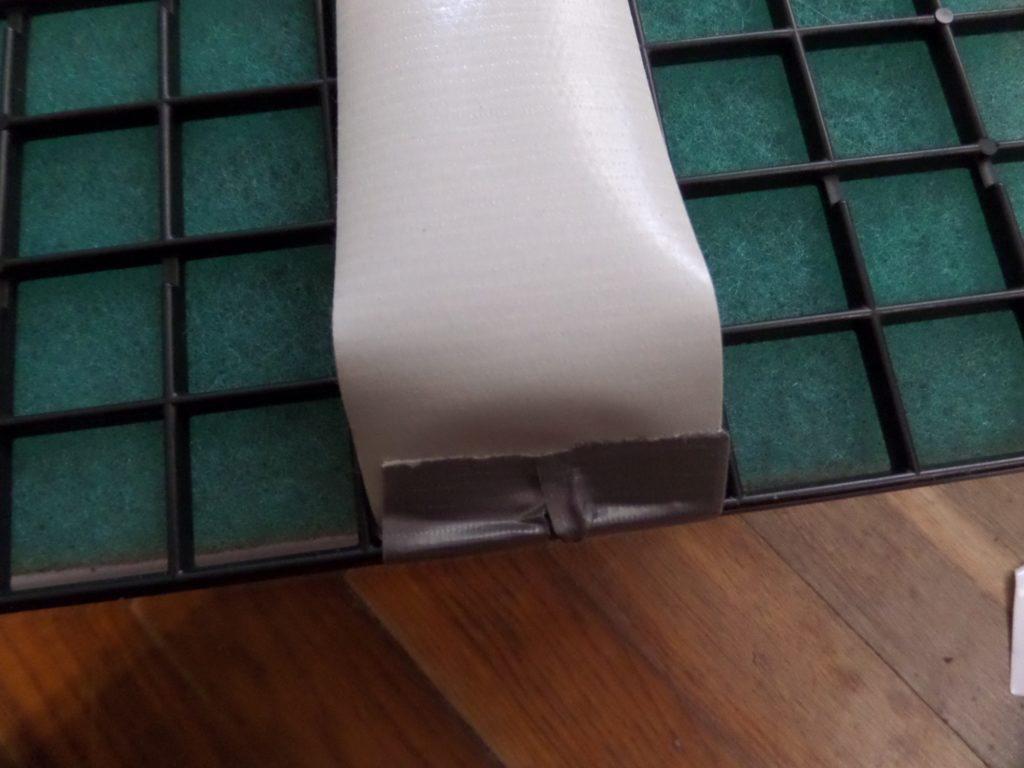
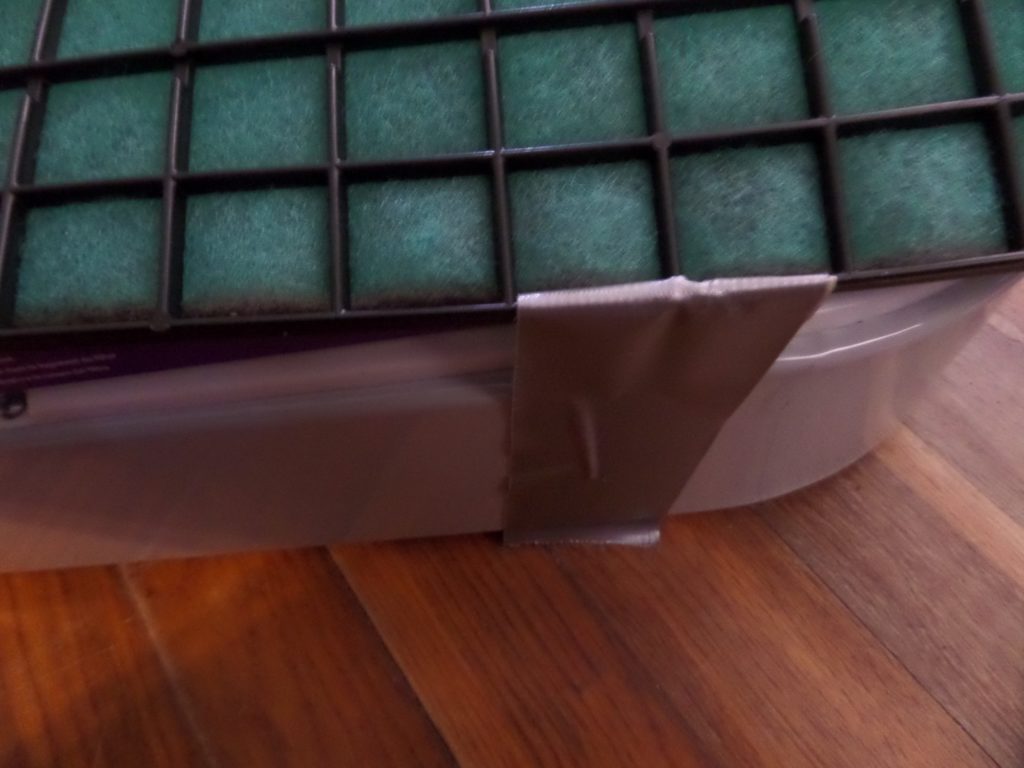







Lewis | February 5, 2018
|
See if it can be convenient for you to post these ideas with a *print* ooption. When I click on that icon, the text and pix show up in a full page format, not ads etc, wasy to print out to szave for hard copy.
remember that all the digital files we save will be unavailable when power grid goes out, and we really need your advice. Printed copy is then available.
Your IT folks can set this up.
thanks in advance
biffula | February 5, 2018
|
Hey Lewis, just copy and paste to a word document. Takes less than a minute to edit out what you don’t want. Then print it. Quit being a self-entitled loser that expects those giving you free info to serve it up to you in a format you see fit.
vocalpatriot | February 11, 2018
|
Or Click on the “download as PDF” option provided at the borrom of the article.
My daughter gave me an old version of kindle which I use to store articles and such like this..works great.
I’m so entitled. ~:D
mIKE | February 5, 2018
|
Great information!! I LOVE THIS IDEA! I’M GOING TO GET TWO FANS SUITABLE FOR THE TASK AND SOME FILTER MATERIAL AND PLACE THEM IN STORAGE FOR WHEN THE TIME COMES TO USE THEM. LIVING IN SOUTHERN CALIFORNIA MEANS WILD FIRES AND POTENTIALLY A LOT OF PARTICULATE MATTER IN THE AIR. THESE COULD COME IN HANDY!
Grammyprepper | February 6, 2018
|
This information is also helpful in choosing your furnace filters, imho. I would suggest using one of these to filter air in, and having a second fan to pull air out at an opposite end of your home. Nice post.(the all caps format of the comment section is a bit confusing, I know it doesn’t show up this way on the blog_
Vikki | February 10, 2018
|
I love this idea too. I already make my own replacement filters for my small 12.00 to 15.00 room air cleaners. The company replacement filters are too expensiVe at around 10.00 each. I keep 3 air cleaners going 24/7 , and I replace the filters about once a week, so that would get pretty expensive. I buy carbon material for 10-20.00 a roll and get 10-12 filters out of it. I also wash the carbon and it lasts for several washes before it seems to stop working. Ive hearD that you can Sit carbon in the sun for a while to “ regenerate” all the pores but I have not tried that. The fact that I make it last through several washes makes it Easy to just fiNally throw out. I will definitely make filters for the box fan I keep poised behind the wood heater. Thank you so much for the wonderful idea.
Karolina | February 14, 2018
|
For example, a MERV 10 filter may capture as much as 70% of pollen and mold spores, but only 20% of bacteria, while a MERV 12 will capture as much as 90% of pollen and mold, but as much as 40% bacteria. Even though both filters will be rated for capturing these particles, the higher MERV rating still means a better rate of capture. Aside from MERV ratings, you may also see some other scales being used such as FPR and MPR. Most filters will come with a handy guide for showing what each filter will remove.
Frank | February 21, 2018
|
My house features a water cooled air conditioner and while it works beautifully for a while, soon as we experience lightning storms, the little box outside that controls (Shut on/off) the water often burns out or lizards get into it. They need constant replacement. And since water has minerals, it has to be regularly flushed and if any pipes crack or leak that’s another problem. So, while it’s important to change the filters, the dirtier they get in any given time,the more we use and it costs to run the darn thing. Every time people open doors or they cut, drill or sand in the house the filter gets dirty in just a week or two.
Even with central air, the Florida environment is humid and their is dust, pollen, etc., in the air all the time. So once in a while someone working here will open a window and my father goes along with that and he himself opens them and forgets to close them, those who dare to suggest it and do it, are ignorant (THey think the air outside is always fresh and cleaner than indoor air) to the reality that opening up windows and doors further exacerbates the problem. I tried to suggest such units to my father, but he didn’t understand as he’s stuck in the conventional and older ways of doing things. The fans in conjunction with washable filter material would be a cheap and useful project to increase air flow and transfer of heat or cold air through a dwelling . People could even expel extremely dirty or hot air outside or bring air (Cool or warm) inside to assist their central air conditioner (Window units too) or to use when the central unit break down and they are waiting for service. Great article and project idea.
Jeff Aubrey | August 16, 2018
|
There is anew product on Amazon.com called the Box Fan Filter Grip that makes it very simple to hold the filter to a box fann.
Jeff Aubrey | January 18, 2019
|
Box Fan Filter Grip reduced the price to $10.95. Link. https://www.amazon.com/new-Box-Fan-Filter-Grip/dp/B07F72D436
Juliette | November 30, 2021
|
RE: Filtration Rate
This box fan air purifier system, while it is filtering the indoor air, will also be stirring up a huge amount of dust particles just by having a fan on. We would prefer not to be in the room when this is taking place.
I’m going with a 5″ Merv 13 filter taped to the back of a 20×20 box fan.
Regarding the important filtration rate, do you know how long would it take to filter the air in small 200 square foot room, so that all the indoor air has been purified, with time for whatever remaining “dust to settle” so to speak? An hour, a day? And how many times, by per how often would this cycle need to take place to maintain clean air? If you don’t know these kind of technical effectiveness questions, can you recommend where to find out?
Thank you : )